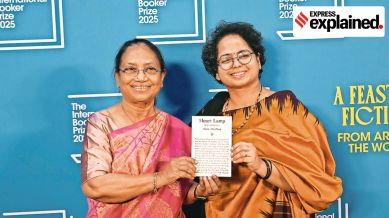Quiet power, revolutions: What shines in International Booker Prize winner Banu Mushtaq’s ‘Heart Lamp’
On Wednesday, Heart Lamp won the International Booker Prize, making Mushtaq the first Kannada writer to receive this honour.

There’s nothing flamboyant about Heart Lamp. No sweeping declarations, no fiery rhetoric. And yet, it burns with a steady, insistent glow. Banu Mushtaq, in this collection of stories, does what only a rare writer can, bringing into view lives that literature often glances past, not by explaining them but by rendering them with clarity, depth, and grace.
On Wednesday (May 21), Heart Lamp won the International Booker Prize, making Mushtaq the first Kannada writer to receive this honour. This moment not only marks a personal triumph but reshapes how Indian literature in translation is regarded, insisting that delicate voices too deserve a global stage.
A rebel writer…
Mushtaq was born in 1948 in Hassan, Karnataka. A lawyer, journalist, activist, and author, she has published six short story collections, a novel, and a volume of essays.
Mushtaq has long championed women’s rights within Muslim communities. She has been an ardent advocate for women’s right to pray in mosques, something that has drawn criticism from orthodox sections of her community, and nearly cost her life.
As a writer, Mushtaq is rooted in Karnataka’s Bandaya (“rebel”) tradition, born in the post-Emergency struggle against caste and class oppression. But her rebellion is in the private sphere: in faith, family, religion, and one’s inner self. Here, resistance is quieter but no less fierce.
…With an empathetic gaze
Mushtaq’s tales feel immediate and unguarded. In her narratives, everyday moments become charged with meaning. For instance, in Black Cobras, Amina’s decision to undergo a tubectomy after bearing seven children is a quiet but profound act of self-assertion, echoing Henrik Ibsen’s A Doll’s House.
In the title story, Heart Lamp, Mehrun attempts suicide but stops when her daughter’s embrace pulls her back. The tenderness here is underscored by a refusal to smooth over the surrounding pain; the lingering grief remains palpable. Even surreal moments like those in High-heeled Shoe, where an unborn child converses with his pregnant mother, serve not to escape reality but to deepen the portrayal of suffering.
These lives, cooking, praying, bargaining for autonomy, bearing unbearable loss, become epic through Mushtaq’s steady, empathetic gaze.
It is this empathy that informs her unique portrayal of Muslim women who, too often in Indian fiction, appear as symbols of oppression or stoicism, brought in merely to prove a point. Mushtaq refuses such flattening. She writes from within her community, capturing the tenderness and tensions, the piety and the pain. Her fiction does not preach; it testifies.
Mushtaq’s empathy also guides her treatment of religion. In Heart Lamp, faith is neither villain nor refuge. It is but terrain to be navigated. A deserted mother seeks help from the mosque committee only to hear that Allah decides who lives and dies. After the child dies, the community’s silent contempt toward the mutawalli is more potent than any sermon, stressing on the essence of faith rather than the ritualistic formalities of religion.
A recognition long due
First awarded in 1969, the Booker Prize is one of the prestigious awards in English fiction. In 2005, the Booker Foundation instituted the International Booker Prize for translated works.
This is the first time a Kannada writer has won a Booker Prize. For a language with centuries of rich storytelling, this recognition is long overdue. That it comes via one slender volume rather than a lifetime’s work — like U R Ananthamurthy’s 2013 nomination — signals a shift: global readers are finally heeding voices that whisper.
This recognition is, in no small part, due to the quality of the English translation by Deepa Bhasthi. Having worked with Mushtaq since 2022, Bhasthi preserves the original’s rhythms by retaining key Kannada words and cadences, letting the readers breathe the stories in their native air.
“Heart Lamp is something genuinely new for English readers. A radical translation which ruffles language, to create new textures in a plurality of Englishes. It challenges and expands our understanding of translation,” said Max Porter, chair of the International Booker Prize 2025 judges.
Above all, Heart Lamp is a call to see the unseen. Mushtaq’s women don’t seek pity or applause; they ask only to be seen in their full humanity. In witnessing their quiet revolutions, acts of endurance, moments of tenderness, the reader learns that sometimes the deepest transformations begin with a single, resolute spark. And sometimes the wounds one carries just heal superficially, leaving the pain as real as the scar on the surface.
In acknowledging that spark and the pain, we carry this remarkable work’s glow forward. One heart, one lamp, one life at a time.